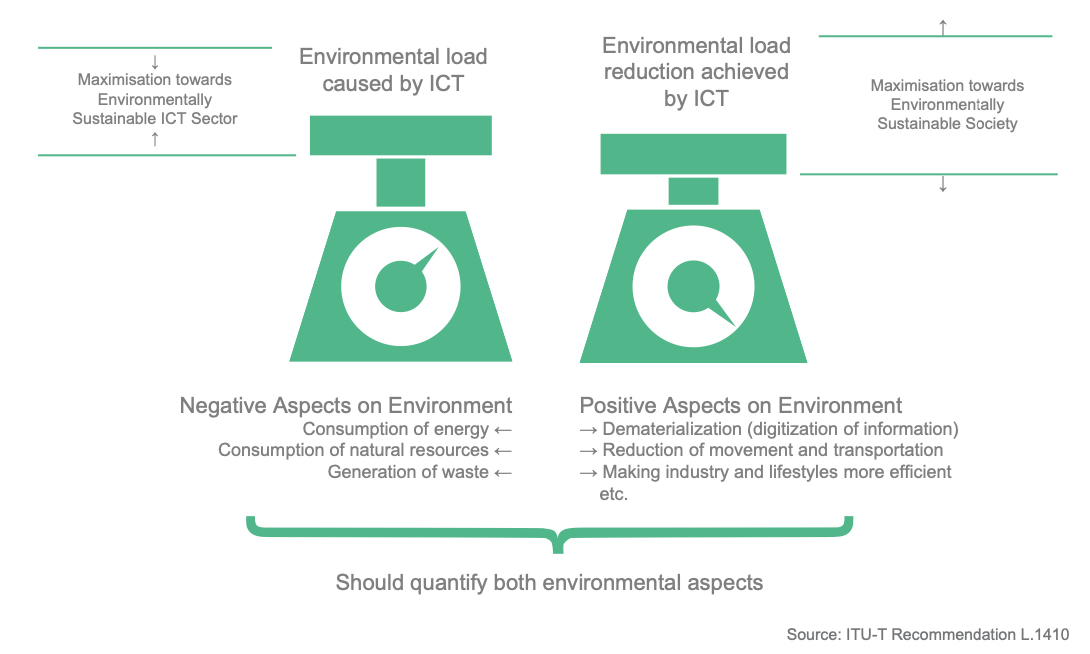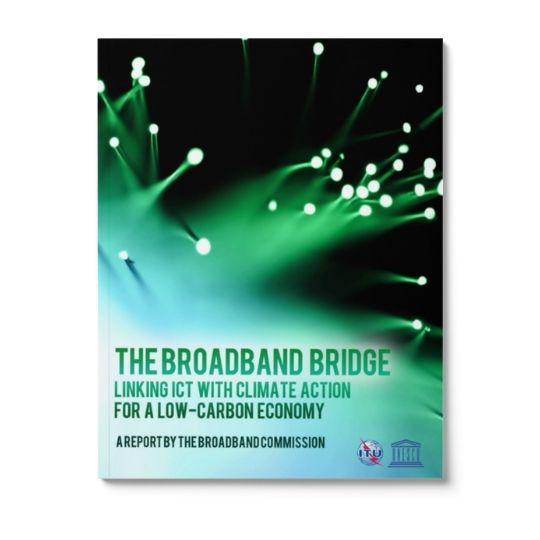How can we use ICTs for climate action towards a low-carbon economy?
The Broadband Commission’s Working Group on Climate Change was chaired in 2012 by Mr. Hans Vestberg, CEO of Ericsson. The Working Group was convened to identify how broadband investments could best be leveraged from a climate perspective. The resulting 2012 Report includes an analysis of the contemporary landscape of information communication technology (ICT) enabling, including government leadership, involvement by the private sector and other stakeholders, as well as a road map and recommendations for further action.
Setting the Stage
Broadband as a Tool for Sustainability
- Creating a low-carbon economy means transitioning from the energy-intensive physical infrastructure of the 20th century to the innovative, connected, information-based infrastructure that will be the hallmark of the 21st century.
Broadband Boosts Economies and Sustainability Initiatives
The Working Group’s 2012 Report pointed to 2009 data from the World Bank, which indicated that, for high- income countries, a 10 percent rise in broadband penetration adds a 1.21 percent rise in economic growth, and 1.38 percentage for low- and middle- income countries.
Not only is broadband development economically efficient for all countries, but it also has huge potential to help shift the world towards a low-carbon economy and address the challenge of climate change. In addition to Gross Domestic Product (GDP) growth and job creation, broadband expansion can deliver vastly enhanced energy efficiency, mitigation, adaption, and real-time monitoring and emergency response.
Monitoring is Necessary to Ensure Sustainability
Broadband development can enable more sustainable economic practices globally. However, it remains vital to quantify and monitor the environmental load caused by ICTs, including consumption of energy, consumption of natural resources, and generation of waste. As ICTs are employed to reduce climate change, the ICT sector must also work to be as environmentally stable as possible. The environmental load reduction achieved by ICT must outweigh the environmental load caused by ICT in order for practices to be sustainable, as demonstrated in the graphic below:

The Way Forward
Conclusions and Recommendations
A lack of awareness about ICT and broadband’s enabling role is a key challenge going forward. Policies and strategies will need to consider how to influence individual behavior and raise awareness to enhance the uptake of broadband-enabled low-carbon solutions among consumers worldwide.
With sound leadership, open and competitive markets that recognize broadband as essential infrastructure and encourage the development and scaling up of solutions will deliver the greatest impact.
The Working Group’s 2012 report, The Broadband Bridge: Linking ICT With Climate Action for a Low-Carbon Economy, identified three vital roles that broadband can play in key areas related to climate change, including:
Transformation: helping other sectors of society to reduce GHGs through dematerialization of physical products and systems, for example, substituting travel with collaborative tools or substituting need to produce physical products by delivering e-products and services
Climate Mitigation: reducing the sector’s own emissions, often referred to as Greening ICT, for example, specific efforts to cut emissions of greenhouse gases within the ICT industry itself, such as developing energy lean products and solutions, setting and delivering on tough reduction targets
Climate Adaptation: changes in processes, practices and structures to reduce the vulnerability of natural and human systems to climate change effects. Broadband can provide viable solutions, for example, weather information and disaster alerts.
Recommendations:
Following an overview of nine pioneering digital practices and six government case studies, the 2012 Report presented ten thoughtful and informed recommendations for how to spur the kind of change that will result in a bold approach to unleashing broadband’s potential to create a networked, low-carbon society of the future.
Bring convergence to ICT policy formulation so
that it aligns with other policy areas such as energy, health, education and
climate in order to maximize impact.
Drive cross-ministry collaboration and integrated decision-making to align climate and digital goals and use government procurement to send the right market signals.
Identify and remove the regulatory and policy barriers currently hindering research and investment in 21st century ICT-based broadband-enabled infrastructure and low carbon solutions.
Encourage uptake of low-carbon solutions and support market change by rewarding or incentivizing desired consumer behaviors. Spur innovation among individuals, companies and sectors.
Fund and facilitate scalable pilots to demonstrate feasibility and effectiveness of broadband as an enabler of low-carbon solutions and build a strong business case to attract private investment.
Cultivate ‘connectivity’ and ‘co-creativity’ across public, private and non-governmental sectors and industries to help develop a collaborative mindset, shared goals, common language and break down silos.
Develop harmonized metrics and measurements and common standards for calculating both ICT’s environmental impacts and the positive contribution it can make to other sectors—from individual products to systems, and from individual households to city or national levels.
Actively disseminate project findings, share best practice and learn from mistakes to identify success factors and facilitate leapfrogging, especially among lesser developed markets. Communicate the opportunities and synergies that can be achieved through an integrated, trans-sector approach to digital development. infrastructure and low carbon solutions.
-
By closing the gap between policy and technology, broadband gains even greater momentum as an engine for change.
The Working Group Model
Composition and Activities

Mr. Hans Vestberg
Chief Executive Officer, Ericsson
Chair: Hans Vestberg
- Rob Bernard, Chief Environmental Strategist, Microsoft (on behalf of Orlando Ayala, Corporate Vice President, Chairman of Emerging Markets and Chief Advisor to Microsoft’s Chief Operating Officer)
- Ali M. Abbasov, Minister of ICTs Azerbaijan
- Bruno Lanvin, INSEAD
- Esteban Pacha, IMSO
- Helen Clark, Administrator, United Nations Development Programme (UNDP)
- Stephen Conroy, Minister for Broadband, Communications and the Digital Economy and Minister Assisting the Prime Minister on Digital Productivity.
- Cheik Sidi Diarra, UN Under-Secretary-General and High Representative for the Least Developed Countries, Landlocked Developing Countries and Small Island Developing States
- Peter Gibson, Wireless Standards and Regulations Manager, Global Public Policy, EMEA, Intel
- Paul S. Otellini, Intel
- Klaus M. Leisinger, Novartis
- Wang Jianzhou, Chairman, China Mobile Communications Corporation
- Sunil Bharti Mittal, Founder, Chairman and Group CEO, Bharti Enterprises
- Robert Pepper, Vice President, Global Technology Policy, Cisco (on behalf of John Chambers, CEO, Cisco)
- Jeffrey Sachs, Director, The Earth Institute at Columbia University
- Hamadoun Touré, Secretary-General, ITU and Vice Co-chair of the Broadband Commission
- Ben Verwaayen, CEO, Alcatel-Lucent
- Sun Yafang, Huawei
- Veena Rawat, RIM
- Luis Neves, GoSi
- Luis Alfonso de Alba, Mexico’s Special Representative for Climate Change, the Principal Negotiator of the Mexican delegation to the UNFCCC, and Vice-Vhair during the 2010 United Nations Climate Change Conference
- Paul Budde, President, BuddeCom,
- Clr Mpho Parks Tau, Mayor, Johannesburg, South Africa
- Anna-Karin Hatt, Minister for Information Technology and Energy, Sweden
- Christina Henryson, Head of Broadband, Ministry for Information Technology and Energy, Sweden
- Stephen Mncube, Chairman, Independent Communications Authority of South Africa (ICASA Luis Neves, Chairman, Global e-Sustainability Initiative (GeSI)
- Gabriel Solomon, Head of Public Policy, GSMA
The Working Group, was launched in Barcelona, Spain on 16 February 2011. The group held three meetings via teleconference on 31 March, 30 May and 4 October 2011.
Focus Area
Outcome Resources
Chair
Mr. Hans Vestberg
CEO, Ericsson
Broadband Advocacy Targets
SDGs









